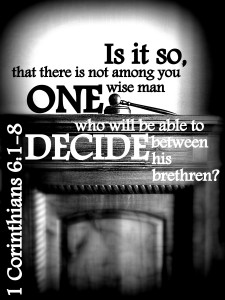Here is a biblical teaching that is nearly non-existent in the modern church. It is the matter of being a self-governing people.
I not talking about congregational rule (polity of how a church is structured). I’m talking about mitigation and mediation among the saints at the local church level. (1 Corinthians 6)
In 1982 US Supreme Court Justice Warren Burger said:
“One reason our courts have become overburdened is that Americans are increasingly turning to the courts for relief from a range of personal distresses and anxieties. Remedies for personal wrongs that once were considered the responsibility of institutions other than the courts are now boldly asserted as legal “entitlements.” The courts have been expected to fill the void created by the decline of church, family and neighborhood unity.” (the Peacemaker, by Ken Sande, page 54)
Is it because churches don’t know about 1 Corinthians 6 or is it that churches know about it and just ignore it? Or worse, is it because there are no wise men among us? Either place, it shows a lack of respect for the word of God.
I know part of the argument is that churches have not done a good job historically of handling judicial matters very fairly because of corruption.
Just because our historic track record is not very good is no reason to not respect the teaching of Scripture.
- What does a formal church litigation process even look like?
- Does your church have a formal process that all members know about and agree to adhere?
- What church matters are being relegated to the secular courthouse/government for a judge to give court ordered mandates and general public welfare?
- What if divorce court rarely had to handle divorce hearings from church members?
- What if welfare matters of children of professing Christians was a matter the church handled?
- What if Christians took care of their own when in need of food and basic needs rather than secular government agencies?
 It seems like a practical and beneficial process for the church of the Lord Jesus Christ to adhere to the teaching of Scripture, and in doing so be a blessing to the communities we live in rather than a burden.
It seems like a practical and beneficial process for the church of the Lord Jesus Christ to adhere to the teaching of Scripture, and in doing so be a blessing to the communities we live in rather than a burden.
What if churches stopped thinking that a block party will make the community like us better and regain her duty of self-governing. I’m not suggesting that a free hot dog day for the neighbors is a bad idea, I’m just saying that the 1 Corinthians 6 issue is a biblical matter.
Justice Scalia made this observation:
“I think this passage [1 Corinthians 6:1-8] has something to say about the proper Christian attitude toward civil litigation. Paul is making two points: first, he says that the mediation of a mutual friend, such as the parish priest, should be sought before parties run off to the law courts… I think we are too ready today to seek vindication or vengeance through adversary proceedings rather than peace through mediation… Good Christians, just as they are slow to anger, should be slow to sue.” (the Peacemaker, by Ken Sande, page 55)
I would like to hear from anyone who knows of a church that has formal steps to help members follow the teachings of self-governing such as 1 Corinthians 6.
photo credit: belongs to the creative property of www.PaulThompsonBlog.com
Scott
February 5, 2015 at 12:11 PMExcellent post Paul. I will be watching to see if there are any churches which have a “formal” process. I have taught this for many years, but as yet, have not had a church willing to follow through as it would also involve having a functioning disciplinary process in the local church. Most believers today want to be provided for by the church, but are are not willing to be disciplined by the church. When any effort is made, my observation is that they either resort to name calling, quit coming, and go to another local church.
I know this is another subject, but particularly here in Utah, the above has resulted far too often in fidelity to denominational doctrine, as people (I use this term wondering if I can use the word “believer” or “Christian” accurately) are becoming more and more willing to “attend” a church with variant beliefs to their own historical beliefs rather than attend a church in which they gave “personal” issues with other believers. I realize this is a whole other post, but am convinced that the two are closely related.
Thank you for sharing.
Be blessed!
Paul
February 5, 2015 at 12:33 PMScott,
Thanks for your thoughts on this. I would like some dialog with others on this. It appears completely missing. In my experience, nearly every attempt to help a person spiraling out of control gets unbelievably messy because there is no expectation of the either party to the loyalty of God.
Is it because the church puts a God unworthy of loyalty in front of people? or a complete disrespect for the authority of the Word of God in general?
(I see your second comment with clarification. I think I read the first as you clarified… The clarification does clarify…)
Lack of fidelity is significant and may be hindering the secular world from experiencing the local church as a blessing from God rather than a blight on the community and part of burdening the secular court.
Keep me informed of any discoveries you make in relationship to this topic… Thanks!
Scott
February 5, 2015 at 12:14 PMSorry, the first sentence of the second paragraph should have read “…resulted in a lack of fidelity to denominational doctrine”